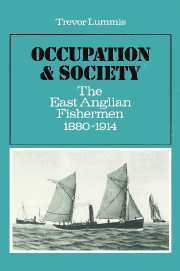Book contents
- Frontmatter
- Contents
- List of figures and tables
- Acknowledgements
- Map
- Introduction
- PART ONE OCCUPATIONAL STRUCTURE
- PART TWO THE SOCIAL STRUCTURE
- PART THREE THE FAMILY, SOCIAL PRACTICE AND BELIEF
- Introduction
- 9 Female waged labour
- 10 Domestic life
- 11 Leisure
- 12 Religion: practice and belief
- 13 Community and conclusion
- Appendix: supplementary information on the interviews
- Glossary
- Notes
- Bibliography and sources
- Index
12 - Religion: practice and belief
Published online by Cambridge University Press: 22 October 2009
- Frontmatter
- Contents
- List of figures and tables
- Acknowledgements
- Map
- Introduction
- PART ONE OCCUPATIONAL STRUCTURE
- PART TWO THE SOCIAL STRUCTURE
- PART THREE THE FAMILY, SOCIAL PRACTICE AND BELIEF
- Introduction
- 9 Female waged labour
- 10 Domestic life
- 11 Leisure
- 12 Religion: practice and belief
- 13 Community and conclusion
- Appendix: supplementary information on the interviews
- Glossary
- Notes
- Bibliography and sources
- Index
Summary
Where did you used to go when you were courting?
Well, they'd have to go and get where they could, there was no pictures at that time of day you know. The wife and I used to go to church on Sundays to Aldeburgh or – wherever we thought best.
3003:50Religion is taken as the final dimension because it forms something of a link between the family, leisure, work and the community. Although the fishermen were largely secular in their outlook religious institutions were as ubiquitous as public houses, and, whatever the degree of individual commitment, were social institutions of considerable influence. Every person interviewed attended somewhere during their childhood. Organised religion was also actively involved in missions to the fishermen and through the testimony of our informants it is clear that they also sent church visitors around the homes in at least some areas. It will be argued, however, that religion did not play a very central role in the lives of the fishermen or their families.
The findings were anticipated in the secondary literature. Contemporary comment particularises the East Anglian fishermen as the one major group of driftermen who would fish on Sundays, and as the trawlermen were away for four or five days it was accepted that they would be at sea and working on Sundays and this caused little comment. In contrast to these deepsea fishermen, inshoremen tended to preserve Sunday as a non-working day and were often committed to various non-conformist sects.
- Type
- Chapter
- Information
- Occupation and SocietyThe East Anglian Fishermen 1880-1914, pp. 147 - 160Publisher: Cambridge University PressPrint publication year: 1985



